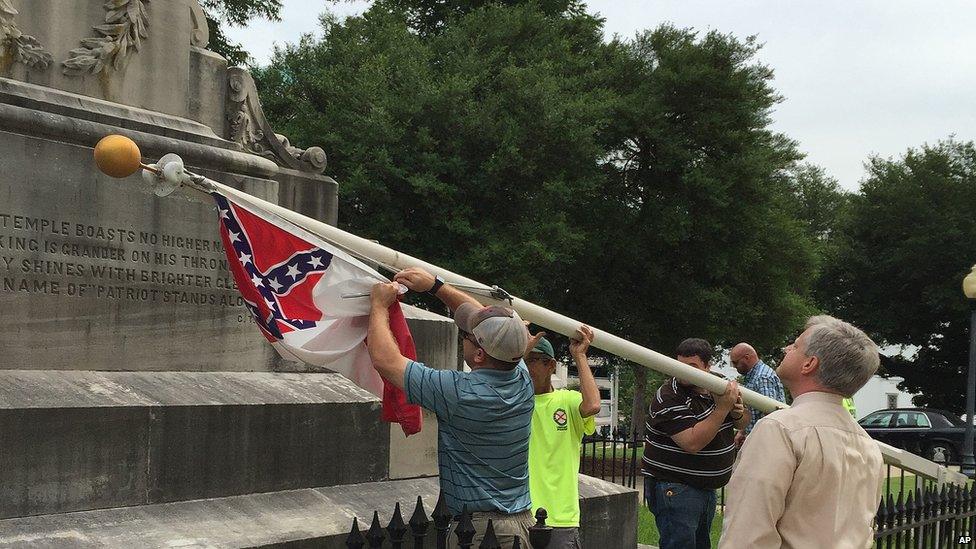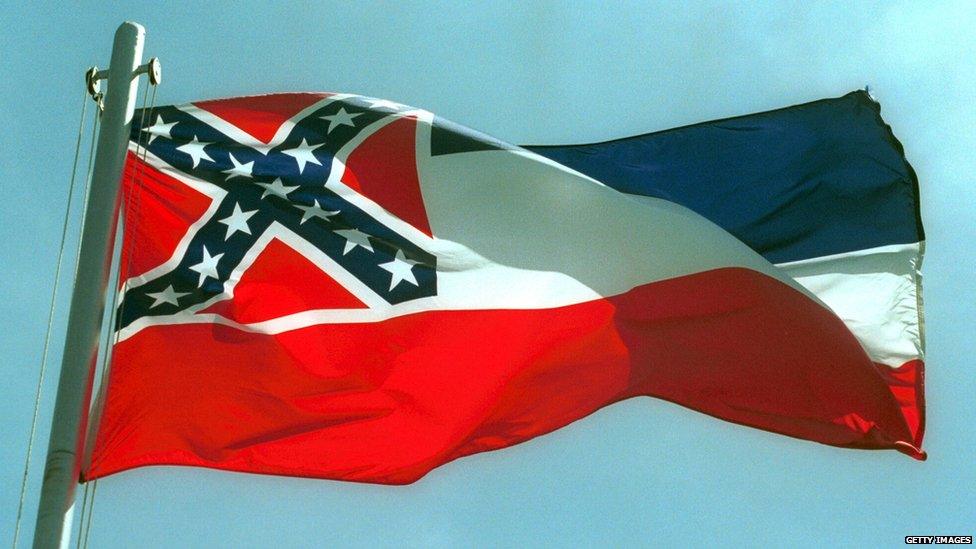Efforts to banish Confederate symbols grow in US south
- Published

State workers take down the flag on Wednesday morning
Anger at the presence of Confederate symbols on public property in the US south is growing.
The Confederate battle flag has been removed from Alabama's state capitol and Mississippi officials have urged the state flag have the emblem removed.
The backlash against the flag was sparked by a mass shooting at a black church in South Carolina last week.
Nine worshippers were killed and the suspected gunman has appeared in photos holding the flag.
Police believe the slaughter at a bible study group week was racially motivated.
The New York Times reported, external that the US Department of Justice "will likely file federal hate crime charges" against Dylann Roof.
His embracing of the flag, which was the Civil War battle flag of the southern states, has prompted politicians to shift positions on this once revered emblem of southern identity.
Four Confederate flags were taken down from a Civil War monument outside the state capitol in Montgomery, Alabama, after Governor Robert Bentley said he did not want the flag to be a "distraction".
Meanwhile, debate has been revived in Mississippi over the presence of a smaller version of the rebel flag within the current state flag.

The Confederate battle flag is part of Mississippi's state flag
Mississippi's House Speaker has called for the state flag to be changed and Senator Roger Wicker has said it should be in a museum.
"I have not viewed Mississippi's current state flag as offensive," Mr Wicker said, but many of his fellow citizens "feel differently" and "our state flag increasingly portrays a false impression of our state to others".

At the scene - Anthony Zurcher, BBC News, Mississippi
The debate over Confederate imagery in the Mississippi flag is exposing a generational divide in the state's Republican Party - and even within one of its most prominent families.
Former Governor Haley Barbour said the Confederate flag has nothing to do with the shootings in Charleston.
"It is part of history, just like George Washington, Thomas Jefferson and Andrew Jackson, who were all slave owners," he said. "Are we now going to change the name of the Washington Monument, too?"
His nephew, state Republican official Henry Barbour, countered: "How can we keep things the same? The flag didn't cause Charleston, but it represents hatred to many, especially our black brothers/sisters."
Fourteen years ago, state voters overwhelming chose to keep their flag as it has been for over 100 years. If that's going to change now, it could be due in part to a generation that's well removed from the civil rights battles of the past.

Other developments around the south include:
South Carolina - Governor Nikki Haley and several prominent leaders have called on the state's legislature to remove the flag from the statehouse grounds
Georgia - Governor Nathan Deal says the state will redesign a car licence plate that features the flag
Virginia - Governor Terry McAuliffe says he wants licence plates featuring the flag to be replaced
Mississippi - State House Speaker Philip Gunn has called for the state to remove a smaller version of the rebel flag that is inset in the state's official flag
Kentucky - US Senate Majority Leader Mitch McConnell has called for the removal of Confederate President Jefferson Davis' statue from the state Capitol's rotunda
Opposition to the flag in southern political circles has been mirrored in the commercial world, with major retailers like Amazon and Walmart removing products with the design.
Confederate groups argue they should not be connected with Roof's actions.
"First it's the flags, then the monuments, then the streets' names, then the holidays," said Kelly Barrow, commander in chief of the Sons of Confederate Veterans.
"I feel like it's open season on anything Confederate."
What do South Carolinians think of the Confederate flag?
The Confederate battle flag became a potent symbol for the southern states fighting the Civil War as they sought to break away from the union.
It is seen by some as an icon of slavery and racism while others say the banner symbolises their heritage and history.
The battle flag's resurgence in the US South occurred in the mid-20th century, during the civil rights movement.

Birth of a flag
seen today on houses, bumper stickers and T-shirts (and Mississippi flag, above)
sometimes accompanied by the words "If this shirt offends you, you need a history lesson"
but it was never the official national flag of the Confederacy, rejected in 1861
instead adopted as battle flag by the Army of Northern Virginia under General Lee
it fast became a potent symbol of Confederate nationalism, more popular than the official national flag
